
Alphabetical Menu
Chronological Menu
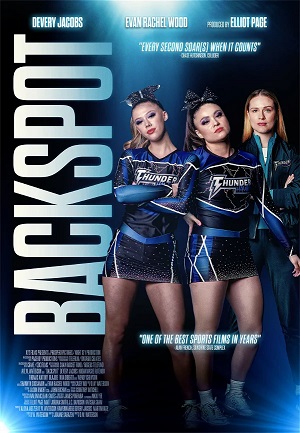
In Backspot, Riley (Devery Jacobs), a high school girl, struggles to deal with her anxiety when she joins a cheerleading squad called the Thunderhawks with her girlfriend, Amanda (Kudakwashe Rutendo) and another teammate, Rachel (Noa DiBerto). Her strict coach, Eileen (Evan Rachel Woods), only exacerbates her anxiety. Backspot is a mildly engaging and visually stylish, but undercooked coming-of-age story. Writer/director D.W. Waterson and their co-writer Joanne Sarazen take a well-worn premise and don't do much with it beyond showing how Riley trains rigorously for the cheerleading squad while trying to navigate her emotions. Riley is young and still at an impressionable age. She's both determined and vulnerable. Backspot The film neglects to explore her relationship with her mother (Shannyn Sossamon) enough as it remains mostly focused on Riley's experiences with her cheerleading squad. There aren't enough scenes that breathe life into Riley or any of the other characters including Eileen who's tough on her and her teammates. The cinematography, though, along with the soundtrack are among the highlights that invigorate the film, but this is a case of style over substance that ultimately fails to pack an emotional punch. At 1 hour and 33 minutes, Backspot opens in select theaters and on VOD via XYZ Films.
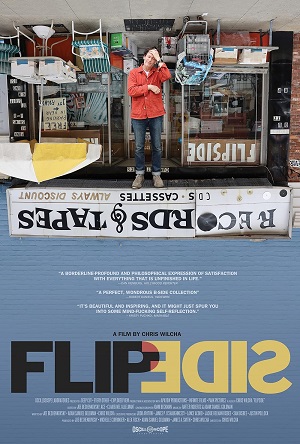
Flipside is a refreshingly honest and surprisingly moving documentary that's only ostensibly about the mission to save Flipside Records, a records store in Pompton Lakes, NJ. It turns out to actually be about director Chris Wilcha's struggles to make a documentary after abandoning other documentaries that he didn't finish making throughout the years. Wilcha used to work at Flipside Records during his teenage years, so it means a lot to him on many levels. He even tracks down his former co-worker and they visit the store together while reminiscing about old times. An interesting anecdote is that there was always a weird smell of meat inside the store, but he managed to find the source of that smell: the records were placed in cardboard boxes that were taken from a local butcher shop. Thematically, Flipside is all over the place and seems unfocused as well as messy, but it's never dull or dry. Wilcha's wit and unflinching candidness are invigorating. He's humble, honest and introspective all of which are important virtues which makes the film a rewarding emotional journey for both him and for the audience. At 1 hour and 31 minutes, Flipside opens at IFC Center via Oscilloscope Laboratories.
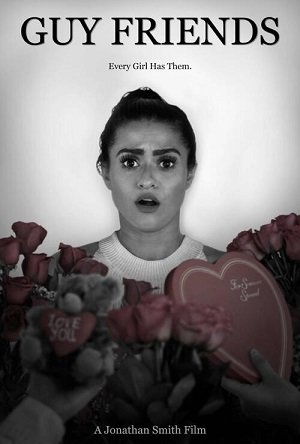
In Guy Friends, Jaime (Kavita Jariwala), gets dumped by her boyfriend, Patrick (Michael Dahlgren). She befriends Sandy (Katie Muldowney) who helps her to deal with all of her guy friends swooning over her. Writer/director Jonathan Smith and his co-writer Chris Siemasko have woven a smart, funny and witty delight with shades of Woody Allen and Eric Rohmer. Sandy seems more emotionally mature and wise when it comes to relationships, so she advises and guides Jaime as her guy friends profess their love of her one after the other. The scenes with Jamie and Sandy are shot in black-and-white interspersed with scenes in color where female friends talk about how they became friends. The filmmakers find just the right offbeat that never takes itself too seriously while also remaining grounded in just enough realism without going-over-the-top or veering into parody. Kudos to them for giving Jaime and Sandy a unique personality that corrently humanizes them and for not relying on lowbrow humor to entertain the audience. In a way, Guy Friends is, indeed, a love story albeit a platonic one between Sandy and Jaime. At a running time of 1 hour and 24 minutes, it opens at Anthology Film Archives via Freestyle Digital Media.

In Haikyu!! The Dumpster Battle, volleyball players from Nekoma High School compete against players from Karasuno High School for the Dumpster Battle. Shoyo (voice of Ayumu Murase) and Tobio (voice of Kaito Ishikawa) are on the same team despite being rivals back in middle school. There are also more players like Kenma (voice of Yuki Kaji), on the opposing team, and Daichi (voice of Yuki Kaji). The screenplay by writer/director Susumu Mitsunaka has so many characters with very underdeveloped backstories. Mitsunaka assumes that you're already familiar with the manga series and doesn't bother to add much of a compelling story. If you're into volleyball, it'll be mildly engaging, but the systemic issue is that you won't know which team to root for nor does the film help you to care about who wins. So, even at a runnin time of 1 hour and 25 minutes, which feels more like 2 hours, Haikyu!! The Dumpster Battle is a dull, exhausting and shallow bore. It pales compared to the much more moving anime film The First Slam Dunk. Crunchyroll releases it in theaters nationwide.
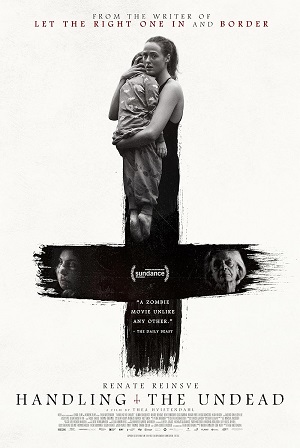
Handling the Undead is an exquisitely shot, poignant, and meditative psychological horror film. The screenplay by writer/director Thea Hvistendahl and co-writer John Ajvide Lindqvist, based on his novel, focuses on three families affected by their loved ones coming back from the dead. Anna (Renate Reinsve) deals with her son resurrected from the dead. Elisabet (Olga Damani), the lover of Tora (Bente Børsum), returns from the dead. Finally, David (Anders Danielsen Lie) learns that his wife Eva (Bahar Pars) has gotten into a car accident and has died at the hospital, but she comes back to life. Like In a Violent Nature, Handling the Undead isn't a conventional zombie film. It's slow paced, very light on exposition, doesn't hold back on the gore and remains consistently somber without much in terms of levity. Both films also suffer from an unimaginative title. The comparisons between those two films end there, though, because they're like night and day. This film is much more emotionally resonating with only a handful of palpable scares. The filmmakers make the most out of the natural landscape which becomes visually poetic at times, so watching Handling the Undead on the big screen would be ideal. Patient audience members will be rewarded the most. At 1 hour and 39 minutes, it opens in select theaters including the IFC Center via NEON.
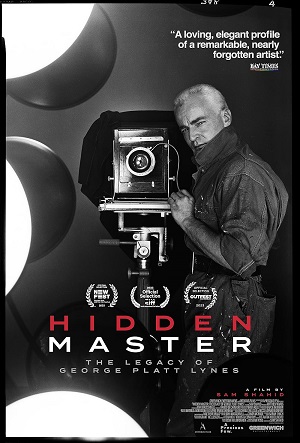
Hidden Master: The Legacy of George Platt Lynes is a well-edited and illuminating documentary biopic about George Platt Lynes, a gay photographer who deserves to be better known. He worked as a fashion and commercial photographer, but his most controversial photographs were the nude portraits he took of men during the 1930s. Lynes hasn't even had a proper exhibit of his photographs, some of which he burned. The ones that were salvaged include the photos that he had given to Alfred Kinsey. Lynes' photographs speak for themselves regarding his immense talent and why he shouldn't be overlooked as an artist, so the talking head interviews merely confirm that as well as the double standard of how photography featuring nude women is more acceptable and less controversial than nude men. One interviewee explains, quite bluntly, that there are simply too many dangly parts on a man's body. Director Sam Shahid follows his life and career linearly, so in terms of structure, this is a pretty conventional film. Shahid is lucky, though, to have such an interesting documentary subject that too few people know about. At 1 hour and 36 minutes, Hidden Master: The Legacy of George Platt Lynes opens at Quad Cinema via Greenwich Entertainment.
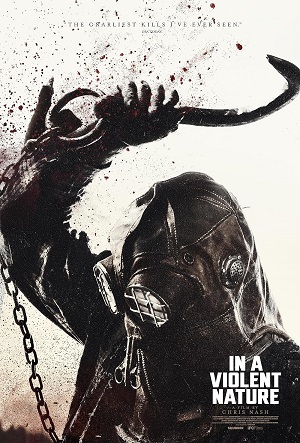
In In a Violent Nature, Johnny (Ry Barrett) resurrects from the dead in the middle of the woods when a group of teenagers steal a locket that his mother gave him. He goes on a killing spree to retrieve it. Writer/director Chris Nash deserves to be commended for taking a big risk by telling the story through the perspective of Johnny once he rises from the ground within the first ten minutes. Johnny's backstory isn't revealed right away, though, so it remains a mystery at first as to why he's looking for the special locket and where his rage comes from. There are no flashbacks, but there's also no character development for any of Johnny's victims of which there are many. The true star of the film isn't the creepy woods setting nor Ry Barrett for that matter; it's actually the very graphic and shocking gore with over-the-top kills. One of Johnny's kills is so bonkers that it almost veers into dark comedy. The excessive violence quickly becomes repetitive, though, as do the many shots of Johnny walking slowly through the woods. The film suddenly changes the perspective to one of the victims during the third act, so it's a shame that Nash doesn't stick to Johnny's point of view all the way through. Why not at least be consistent? At a running time 1 hour and 34 minutes, In a Violent Nature is bold and unflinchingly violent, but tedious, uninspired and dull. It opens nationwide via IFC Films and Shudder. 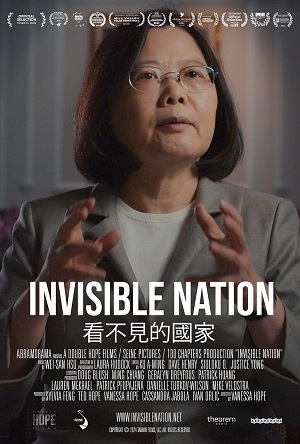
Invisible Nation is an occasionally fascinating, but often hagiographic, overstuffed and myopic documentary about the history of Taiwan, the struggles for democracy in Taiwan and the struggles of Tsai Ing-wen, Taiwan's first female president. Director Vanessa Hope deserves credit for gaining access to Tsai Ing-wen whom she interviews. However, she bites off more than she could chew without exploring the themes with enough depth or asking enough good questions. For example, what is democracy? How does Tasi Ing-wen envision a functional democracy? Invisible Nation shows how she has tried to improve Taiwan's international relations and have it recognized as a country rather than a province of China. More background information about her would've been helpful. She deserves her own separate documentary biopic. Hope interviews other members of Taiwan's government along with regular citizens of Taiwan. Unfortunately, Invisible Nation feels unfocused and dry without being fair, balanced or provocative enough. It opens at Quad Cinema via Abramorama.
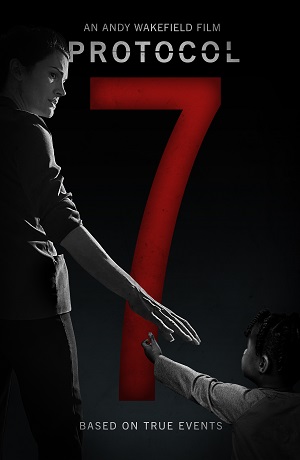
In Protocol 7 is a heavy-handed and shallow thriller about a lawyer, Alexis (Rachel G. White) and a doctor, Dr. Jay (Matthew Marsden), who team with Steve (Josh Murray), a virologist at a Big Pharma company, to expose the company's fraudulent test results for a MMR vaccine. The screenplay Andrew Wakefield and his co-writer, Terry Rossio, suffers from stilted, on-the-nose dialogue and clunky exposition. Alexis has a son with autism which she blames the MMR vaccine for, so that fuels her passion to bring the pharmaceutical company to justice and to risk her career. She even lets Dr. Jay hire her for her legal services for just $1. Protocol 7 lacks the suspense found in smarter and more nuanced thrillers like The Insider. Nuance and subtlety aren't among the film's strengths. The characters remain underwritten and more like plot devices. It's not a good sign when you can hear the wheels of the screenplay turning either. Moreover, the performances are mediocre at best and the editing feels choppy at times. There's nothing exceptional about the cinematography or anything else regarding the production values that would've added visual style that's only found in the opening credits sequence. At 1 hour and 38 minutes, Protocol 7 opens via Abramorama at LOOK Dine-In Cinemas W57.
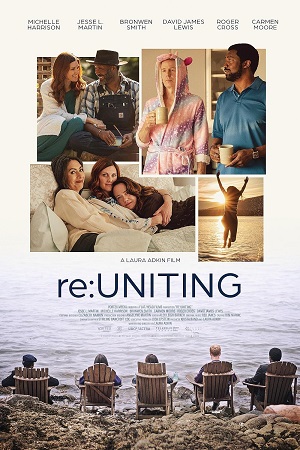
In Re: Uniting, six college friends spend the weekend together for their 25-year reunion: Rachel (Michelle Harrison), Collin (Roger Cross), Danny (David Lewis), Carrie (Bronwen Smith), Natalie (Carmen Moore), Michael (Jesse L. Martin), Natalie's husband. The screenplay by writer/director Laura Adkin occasionally veers toward contrived and maudlin territory and the on-the-nose dialogue doesn't sparkle with wit nor is there enough comic relief. However, Adkin manages to see and treat the characters as human beings, warts and all. Even though they're grown-ups, they each have a lot of growing up to do, and it's genuinely moving to watch them as they experience epiphanies and express their emotions. A small detail like how Carrie hasn't let out all her frustrations by screaming into the wind reveals a lot about her, and when she finally manages to scream, it feels like a form of catharsis as well as emotional maturity. There's a sense that you're eavesdropping on the private moments of some of these characters, although the film would've benefited from more of those private moments. Re:Uniting has no villains nor does it go bonkers. Most importantly, the performances are decent, none of the characters are annoying or over-the-top, and there's no reliance on lively music to overshadow or to drive the narrative (I'm looking at you, The Big Chill). This would be an interesting double feature with another film opening this weekend about friends reuniting called Summer Camp which is actually a light, zany comedy with a little drama. At 1 hour and 40 minutes, Re: Uniting, a warm and tender drama, opens at LOOK Dine-In Cinemas W57.
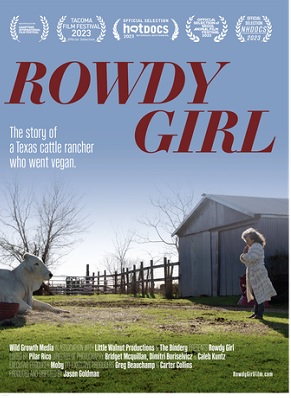
Rowdy Girl is a provocative, vital and engrossing documentary about Renee King-Sonnen, a cattle rancher, who convinced her husband, Tommy Sonnen, to convert his beef cattle ranch to an animal sanctuary. Jason Goldman opts for a laissez-faire, fly-on-the-wall approach by avoiding talking-head interviews and just filming Renee and her husband at their home and animal sanctuary, namely, the Rowdy Girl Sanctuary. There's no flashy cinematography or an overbearing music score, so Goldman has faith in Renee and Tommy's story to emotionally propel the film and he also trusts the audience's emotions concurrently. It's fascinating to learn how Renee experienced her epiphanies that led to her radical decision to not only stop raising and killing cattle for her husband's beef production business, but also to become vegan. Rowdy Girl doesn't dwell on the horrors of the meat packing industry like Food, Inc. manages to do nor does it become preachy or heavy-handed. The images of Renee bonding with one of the animals in the sanctuary and displaying her compassion, empathy, and introspection are equally heartwarming and inspirational. At 1 hour and 12 minutes, Rowdy Girl opens at DCTV's Firehouse Cinema via Argot Pictures.  Samsara is a surreal, engrossing and mesmerizing meditation on death and rebirth. The screenplay by writer/director Lois Patiño and co-writer Garbiñe Ortega follows an elderly woman, Mon (Simone Milavanh) as a young monk, Amid (Amid Keomany), prepares her for her imminent death before she goes to the Bardo and, later, to her new life where she's reincarnated as a goat. Exposition is kept to a minimum and there's also very little narrative. You don't learn much about what Mon's life was like before she died because the film begins near the very end of her life. Samsara shouldn't be confused with the Ron Fricke documentary from 2011, but both films are visually stunning experiences that transcend beyond words. This Samsara is much more experimental, though, with a long scene of flashing lights reminiscent of The Flicker. It's a scene that becomes nauseating and overwhelming, but perhaps that's part of the point. The dreamlike cinematography, use of colors and lighting add style that's concurrently part of the film's substance. Samsara opens at The Metrograph and deserves to be seen on the big screen. The Dead Don't Hurt 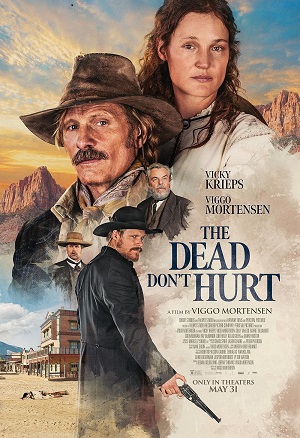 Holger (Viggo Mortensen), a carpenter, meets Vivienne (Vicky Krieps), falls in love with her, and persuades her to move in with him at his shack in Nevada near a small town with a corrupt mayor, Rudolph (Danny Huston). She finds a job working at the town's saloon while he becomes the town's sheriff. Soon enough, Holger goes off to fight in the Civil War leaving her all alone. When he returns a few years later, he seeks revenge against Weston (Solly McLeod) who had raped and impregnated Vivienne while he was serving in the war. Set in the 1860s, the screenplay by writer/director Viggo Mortensen follows a non-linear structure that doesn't make the plot confusing or convoluted, but it does diminish the suspense because key information get revealed too soon. Mortensen spends a lot of time setting up the story with exposition before getting to the meatier part: Holger's revenge against Weston. The dialogue is fine without any stitled lines, although comic relief is sorely missing here. Holger stating the film's title in a quip toward the end feels awkward and unintentionally funny, though. The Dead Don't Hurt also has too many underwritten characters like Rudolph, the mayor. Weston comes across as a one-dimensional villain which makes him cartoonish. That said, once the film reaches its revenge subplot, it becomes slightly more engaging and even thrilling at times, but it's not very exciting to get to the point. Viggo Mortensen and Vicky Krieps try their best to rise above the mediocre screenplay, and they mostly succeed thanks to their charismatic performances and palpable chemistry together. The cinematography and breathtaking scenery help to make the film feel more cinematic in scope while adding visual poetry. Mortensen opts for a very slow pace which means that he trusts the audience's patience. The pace does crawl too slow at times, though, and the third act has at least two false endings and overstays its welcome. At 2 hours and 9 minutes, The Dead Don't Hurt is a picturesque, slow-burning Western, but emotionally hollow and low on suspense.
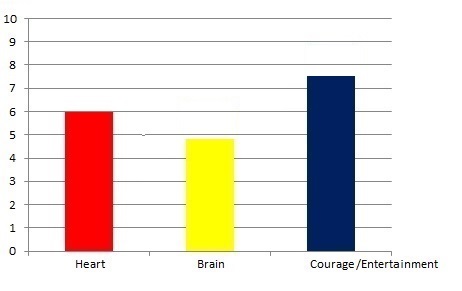 Ezra 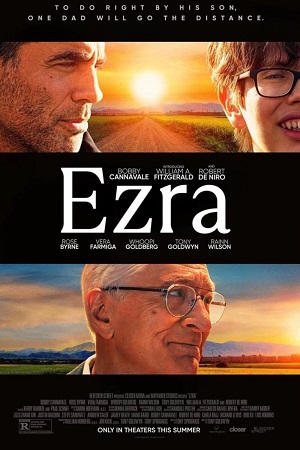 Max (Bobby Cannavale), a stand-up comedian, lives in New Jersey with his father, Stan (Robert De Niro), and shares custody of his autistic 11-year-old son, Ezra (William Fitzgerald), with his ex-wife, Jenna (Rose Byrne). An incident causes Ezra to get expelled from his public school. Max doesn't want to send him to a special needs school, but Jenna disagrees with him. When his agent (Whoopi Goldberg) gets booked on Jimmy Kimmel Live! in Los Angeles, he decides to kidnap Ezra and embark with him on a cross-country trip to LA. The screenplay by Tony Spiridakis finds just the right balance between humor and heartbreak. Max struggles in his stand-up comedy career, hasn't found a new lover after divorcing from his wife, and concurrently struggles to raise his autistic son, Ezra. Even though he takes Max on a road trip without Jenna's permission which is technically kidnapping, he's far from a villain. He's flawed and desperate, but, fundamentally, he loves his son. You also briefly get a glimpse of where Max's relationship issues come from when you learn about how Max's father, Stan, left his mother during his childhood. Stan initially has issues acknowledging his actions and the consequences of his actions, but in one of the film's most moving scenes, he shows that he's actually a decent father after all. So, there are no villains throughout the film---not even a silent villain, like cancer, so kudos to screenwriter Tony Spiridakis for keeping the story focused and engrossing. The humor is often funny and witty while avoiding the kind of lowbrow, gross-out toilet humor found in too many films these days. Fortunately, Spiridakis understands the concept that comedy is often deeply rooted in tragedy because he does an effective job of balancing the different tones without tonal unevenness, going over-the-top, or veering into schmaltz or maudlin territory. It's thoroughly fascinating to watch how Max and Ezra's relationship evolves. Their not only a physical one, but also an emotional and spiritual one because they experience epiphanies along the way which, by the time the end credits roll, will leave you with a smile on your face. Bobby Cannavale gives one the best performances of his career. Max is one of his most interesting and memorable roles since playing Joe in The Station Agent because it showcases his ability to tackle comedy and drama convincingly while allowing to exude plenty of warmth and charisma. William Fitzgerald is a revelation as Ezra. He gives a breakthrough performance. Rose Byrne and Robert De Niro are also superb while Whoopi Goldberg, Rainn Wilson and Vera Farmiga make the most out of the brief scenes. The film moves at a brisk pace that's not too fast nor too slow without feeling choppily edited either. Ezra ultimate strength, though, is that director Tony Goldwyn and screenwriter Tony Spiridakis manage to find the right balance between Truth and Spectacle while finding the Spectacle within the film's Truth a.k.a. its humanism, a truly special effect. At a running time of 1 hour and 40 minutes, Ezra is warm, wise and wonderful. It's a captivating, funny and heartfelt journey well worth taking. It would make for a great double feature with Little Miss Sunshine. 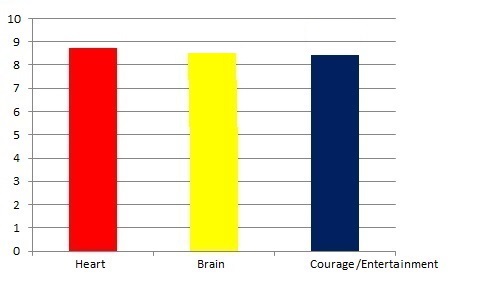 What You Wish For 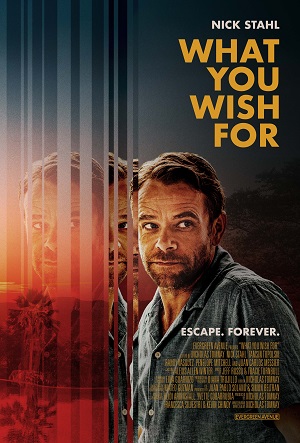 Ryan (Nick Stahl) travels to a villa in Latin America to visit Jack (Brian Groh), a private chef for wealthy people. He hasn't seen Jack since they were roommates back in culinary school over a decade ago. When Jack suddenly commits suicide, Ryan disposes his body and steals his identity just in time for Imogene (Tamsin Topolski), Jack's mysterious employer, to assume that he's Jack and to expect him to prepare a special meal for her clients. The screenplay by writer/director Nicholas Tomnay deftly blends psychological thrills, suspense and dark comedy. When Ryan calls Jack's bank to gain access to his finances, that's when the plot's plausibility begins to wane. He claims to the bank rep over the phone that he's been in an accident and suffers from memory loss, so he doesn't remember his online password along with another key piece of information needed to prove his identity to the rep. The audience is also supposed to believe that he can successfully order a fake ID over the internet through a brief Google search. All of that, including Jack's suicide, occurs within the first 20 minutes or so. Although the plot lacks logic, it compensates for that with its imaginative twists and turns which occasionally leads to some tonal whiplash. Tomnay has a good command of exposition because he knows how and when to reveal certain bits of information. Sometimes the audience knows more and sometimes less, so there's room for a few surprises. Once Imogene arrives and Ryan learns the secret ingredient in Jack's "special" food that he prepares, What You Wish For takes a much darker turn. Soon enough, a police detective (Randy Vasquez), shows up to investigate his nephew who has gone missing, but the audience already knows what happened to him and why, so it's just a matter of when the detective will uncover the dark truth. Tomnay deserves to be commended for piling on twist after twist, but that's a minor, forgivable flaw.
Nick Stahl gives a solid performance as Ryan and makes the most out of his role while rising above the shallow screenplay. The pace moves briskly without moving too fast or too slow. The scenes with the food preparation are mouth-watering until a major twist arrives. There's some gore and at least one moment that might make you feel a bit queasy, but the film doesn't rely on violence or blood and guts to provoke and engage the audience. As long as you don't pick the plot apart for plausibility, you'll find What You Wish For to be a gripping and wildly entertaining ride.
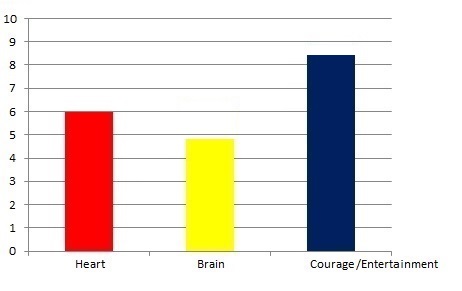 |